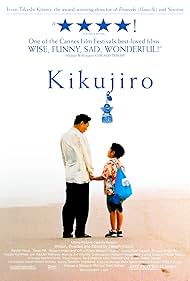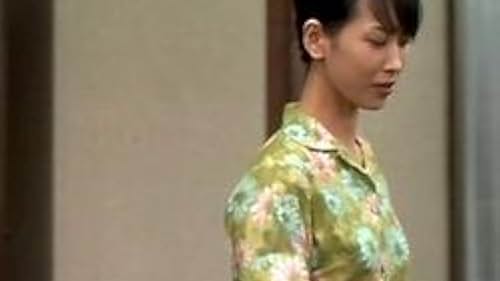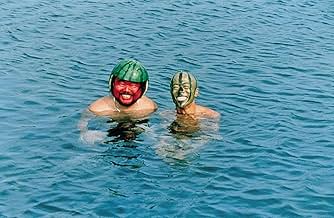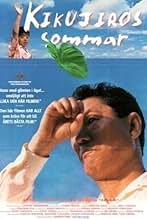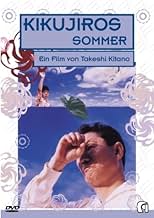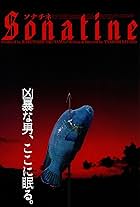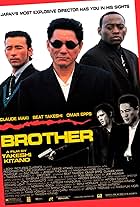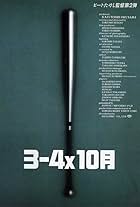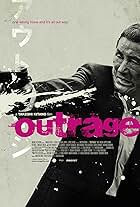AVALIAÇÃO DA IMDb
7,7/10
23 mil
SUA AVALIAÇÃO
Um rapaz, jovem e ingênuo sai sozinho na estrada para encontrar sua mãe rebelde. Logo ele encontra um improvável protetor, um homem rabugento, e os dois têm uma série de aventuras inesperada... Ler tudoUm rapaz, jovem e ingênuo sai sozinho na estrada para encontrar sua mãe rebelde. Logo ele encontra um improvável protetor, um homem rabugento, e os dois têm uma série de aventuras inesperadas ao longo do caminho.Um rapaz, jovem e ingênuo sai sozinho na estrada para encontrar sua mãe rebelde. Logo ele encontra um improvável protetor, um homem rabugento, e os dois têm uma série de aventuras inesperadas ao longo do caminho.
- Prêmios
- 4 vitórias e 4 indicações no total
Takeshi Kitano
- Kikujiro
- (as Beat Takeshi)
The Great Gidayû
- Biker
- (as Gurêto Gidayû)
Beat Kiyoshi
- Man at Bus Stop
- (as Bîto Kiyoshi)
Yôji Tanaka
- Yakuza Henchman
- (as Yoji Tanaka)
Enredo
Você sabia?
- CuriosidadesTakeshi Kitano made this gentler film as an antidote to his usual violent gangster movies.
- Cenas durante ou pós-créditosThere's one more scene after the credits.
- ConexõesFeatured in Jam session - Kikujiro no natsu koshiki kaizokuban (1999)
- Trilhas sonorasSummer
Written by Joe Hisaishi
Avaliação em destaque
In the title role of this highly original 1999 road movie, Beat Takeshi - with his twitching eye and bow-legged shuffle - looks and acts like a cross between Mickey Rourke and Harvey Keitel with a heavy dose of Walter Matthau's sourpuss demeanor (circa "The Bad News Bears") for good measure. He creates a truly memorable character - cynically profane, unapologetically insulting, childishly manipulative and somehow likable. As the director and screenwriter of said film, Takeshi Kitano - the same guy - has fashioned something quite unique from a tired premise - a boy's search for his mother and the gruff man who begrudgingly helps find her. What could have been a predictable and sentimental wallow, especially with the indiscriminate use of angels as a pervasive symbol, is instead an idiosyncratic, emotionally adroit film that sometimes simmers on the cusp of violence.
Yet it becomes ultimately affecting almost in spite of itself. In fact, Kitano does such a resolutely offbeat job that at certain times, the film reminds me of the narrative ellipses and low steady shots that were the trademark of Yasujiro Ozu's home dramas, intermingled with a surprisingly intense Quentin Tarantino-like, in-your-face edginess. The protagonist of the film is really the latch-key nine-year old, Masao, who is on a quest to find the mother whom his grandmother says is "away working". With his sad eyes and cherubic face, Yusuke Sekiguchi is perfectly cast as Masao providing the moral compass for the story. Whether he is running with his arms flailing or forlornly playing soccer by himself, he is poignant without being saccharine and completely natural. It is Masao's scrapbook that provides the framework for the film lending each chapter a descriptive title. Every chapter has a distinct character that is, in various turns, playful, hilarious, disturbing, surreal and heartbreaking. Case in point: Kitano is not afraid to use a child molester as first an uncomfortable source of black humor and then as the subject of Masao's nightmare. My favorite scenes come toward the end when Kikujiro organizes a motley crew of misfits to play games with Masao and have them masquerade as Indians, aliens, marine life and even watermelons. The variety in tone between chapters makes for unexpected tonal shifts, but somehow it works and adds to the greater context of the story.
That Kitano is able to manage a consistent film-making style with a strong visual sense is a credit to the talent behind the camera - not only Kitano's direction, script and film editing but also his artwork showcased throughout the movie, Katsumi Yanagishima's sharply rendered cinematography and Joe Hisaishi's evocative Windham Hill-like score. There are some funny sideline performances from Gidayu Great and Rakkyo Ide as Fatso and Baldy, two bikers who turn out to be the Abbott and Costello of soft-hearted slackers; Nezumi Mamura as a free-spirited drifter; Fumie Hosokawa as a relentlessly perky girl with a talent for juggling; and in the opening sequence, Kayoko Kishimoto as Kikujiro's take-no-prisoners wife. Kitano, however, elicits the most laughs if only for the film's central conceit that he gets away with his infantile gangster behavior. One would think the story would climax when Masao comes upon his mother, but Kitano confounds expectations with every new scene. The DVD really has no extras other than a couple of trailers not related to the film (not coincidentally, one is for Walter Salles' "Central Station" which has a similar story structure). I know this film has its detractors, especially among fans of Kitano's bloodier work, but I find it intriguingly ambiguous and thoroughly enjoyable.
Yet it becomes ultimately affecting almost in spite of itself. In fact, Kitano does such a resolutely offbeat job that at certain times, the film reminds me of the narrative ellipses and low steady shots that were the trademark of Yasujiro Ozu's home dramas, intermingled with a surprisingly intense Quentin Tarantino-like, in-your-face edginess. The protagonist of the film is really the latch-key nine-year old, Masao, who is on a quest to find the mother whom his grandmother says is "away working". With his sad eyes and cherubic face, Yusuke Sekiguchi is perfectly cast as Masao providing the moral compass for the story. Whether he is running with his arms flailing or forlornly playing soccer by himself, he is poignant without being saccharine and completely natural. It is Masao's scrapbook that provides the framework for the film lending each chapter a descriptive title. Every chapter has a distinct character that is, in various turns, playful, hilarious, disturbing, surreal and heartbreaking. Case in point: Kitano is not afraid to use a child molester as first an uncomfortable source of black humor and then as the subject of Masao's nightmare. My favorite scenes come toward the end when Kikujiro organizes a motley crew of misfits to play games with Masao and have them masquerade as Indians, aliens, marine life and even watermelons. The variety in tone between chapters makes for unexpected tonal shifts, but somehow it works and adds to the greater context of the story.
That Kitano is able to manage a consistent film-making style with a strong visual sense is a credit to the talent behind the camera - not only Kitano's direction, script and film editing but also his artwork showcased throughout the movie, Katsumi Yanagishima's sharply rendered cinematography and Joe Hisaishi's evocative Windham Hill-like score. There are some funny sideline performances from Gidayu Great and Rakkyo Ide as Fatso and Baldy, two bikers who turn out to be the Abbott and Costello of soft-hearted slackers; Nezumi Mamura as a free-spirited drifter; Fumie Hosokawa as a relentlessly perky girl with a talent for juggling; and in the opening sequence, Kayoko Kishimoto as Kikujiro's take-no-prisoners wife. Kitano, however, elicits the most laughs if only for the film's central conceit that he gets away with his infantile gangster behavior. One would think the story would climax when Masao comes upon his mother, but Kitano confounds expectations with every new scene. The DVD really has no extras other than a couple of trailers not related to the film (not coincidentally, one is for Walter Salles' "Central Station" which has a similar story structure). I know this film has its detractors, especially among fans of Kitano's bloodier work, but I find it intriguingly ambiguous and thoroughly enjoyable.
- EUyeshima
- 12 de dez. de 2005
- Link permanente
Principais escolhas
Faça login para avaliar e ver a lista de recomendações personalizadas
- How long is Kikujiro?Fornecido pela Alexa
Detalhes
- Data de lançamento
- País de origem
- Centrais de atendimento oficiais
- Idioma
- Também conhecido como
- Kikujiro
- Locações de filme
- Sensoji Temple, Asakusa, Taito, Tóquio, Japão(Masao and his friend walk across the temple grounds)
- Empresas de produção
- Consulte mais créditos da empresa na IMDbPro
Bilheteria
- Faturamento bruto nos EUA e Canadá
- US$ 200.920
- Fim de semana de estreia nos EUA e Canadá
- US$ 28.079
- 28 de mai. de 2000
- Faturamento bruto mundial
- US$ 281.527
- Tempo de duração2 horas 2 minutos
- Cor
- Mixagem de som
- Proporção
- 1.85 : 1
Contribua para esta página
Sugerir uma alteração ou adicionar conteúdo ausente

Principal brecha
By what name was Verão Feliz (1999) officially released in Canada in French?
Responda